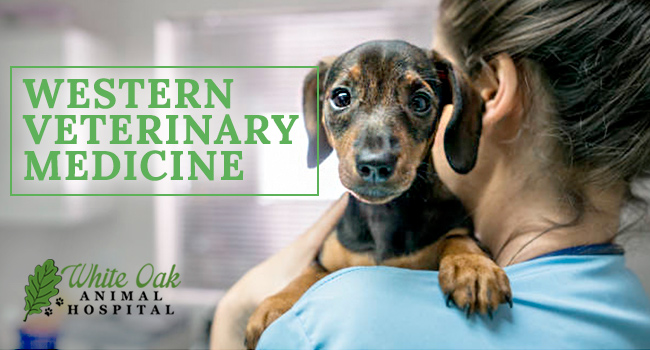
What is Western Veterinary Medicine?
Western Veterinary Medicine is the process of treating symptoms with drugs, surgery, or radiation.
Western, or conventional, medicine had its breakthrough in the early 1800s. New medications and methods have been developed over the years. As a result of continuous research, Western medicine continues to evolve and improve every day.
Drugs such as amoxicillin, prednisone, Zyrtec®, and Prilosec® are common medicines used by many doctors today.
Why choose Western Veterinary Medicine?
We think the question should be ‘when’ more so than ‘why.’
Opposed to using herbs, as in Eastern medicine, modern-day drugs typically work faster and are more readily available. Antibiotics are usually the first choice when dealing with time-sensitive matters, such as infection.
For more severe cases, such as a pet with a broken leg, surgery may be necessary.
Western veterinary medicine and Eastern veterinary medicine both have their positives and negatives. As a result, we encourage people to combine the two as much as possible.
Our Western Veterinary Medicine Services
Dentistry
Every dental cleaning includes:
- Dental exam
- Teeth scaling to remove tartar above and below the gum line
- Polishing the teeth to “smooth down” the surface and build a resistance to future plaque formation
- Antiseptic flushing to remove cleaning debris and bacteria.
Dentistry is an outpatient procedure that requires anesthesia. Pre-anesthetic blood work may be required depending on your pet’s age or health conditions.
Endoscopy
Veterinary endoscopy enables us to visualize your pet’s gastrointestinal system. This method makes diagnosing and treating oral, esophageal, stomach, colon, and upper intestinal tract diseases much easier.
Anesthesia is mandatory for proper evaluation. Pets are placed under sedation or general anesthesia, and then a flexible endoscope (about the diameter of your ring finger) is inserted into the cavity being visualized.
Laboratory
Pharmacy
Radiology & Ultrasound
High-quality radiographs (X-rays) are vital in ensuring an accurate diagnosis. We perform radiographs on-site, and results are available immediately. Radiography helps evaluate your pet’s musculoskeletal, cardiovascular, respiratory, gastrointestinal, reproductive, and urinary systems.
Ultrasonography is a noninvasive technique for obtaining a three-dimensional image using sound waves. It allows us to visualize the heart, liver, spleen, kidneys, stomach, intestines, pancreas, adrenal glands, and bladder. Ultrasound is also helpful for pregnancy exams, tendon evaluation, fluid collection, and biopsies.
Animal Surgery
Our goal is to ensure the safest, most efficient, pain-free procedures for your pet. Our surgical suite has a heated surgery table, advanced sterilization techniques, ECG and oxygen saturation monitor, intra-operative fluid delivery, and post-operative pain management.
- Cranial Cruciate Tear repair
- Patella Luxation
- Fracture Repair
- Spay/Neuter
- Abdominal Exploration
- Tumor Removal